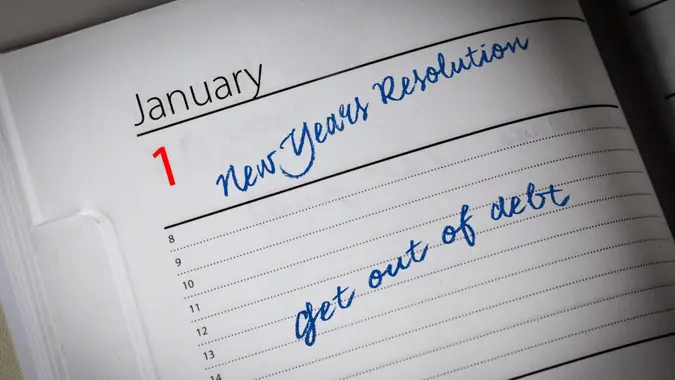Dave Ramsey’s Best Debt Advice To Help You Start 2025 Right

Commitment to Our Readers
GOBankingRates' editorial team is committed to bringing you unbiased reviews and information. We use data-driven methodologies to evaluate financial products and services - our reviews and ratings are not influenced by advertisers. You can read more about our editorial guidelines and our products and services review methodology.

20 Years
Helping You Live Richer

Reviewed
by Experts

Trusted by
Millions of Readers
According to the Federal Reserve, just over 77% of Americans have some kind of debt. This can be credit cards, student loans, mortgages or any other kind of money owed. While you might have more — or less — debt than the next person, owing money can still be stressful, especially as you head toward the new year.
The good news is that there are ways to manage or even eliminate your debt. Well-known financial guru Dave Ramsey is known for educating people about finances and debt. Here’s some of his best debt advice to help you start 2025 right.
Tackle Your Debts One at a Time
When you owe money across multiple accounts, trying to juggle them all can feel overwhelming. One of Ramsey’s top methods to manage those debts is the debt snowball method.
Here’s how it works.
- List all your debts, ranked from the smallest balance to the largest balance.
- Make the minimum payments on all your debts except the one with the smallest balance.
- Pay as much as you can on the smallest debt until it’s gone (this may require creating and following a strict budget).
- Once the smallest debt is paid off, move on to the next smallest debt and repeat the process. Use the freed-up money from the first debt to make even larger payments on the next.
- Rinse and repeat until all debts are gone.
As Ramsey said in an Instagram post, the average person who follows the debt snowball method will be debt-free in 18 to 24 months (excluding mortgage debt).
Choose the Debt Reduction Method That Works
Plenty of debt management and reduction strategies exist, but not all of them work equally well or are as beneficial as the next. Here are some of the top methods Ramsey suggested steering clear of.
- Debt consolidation: This involves taking out a loan that rolls several smaller debts into one, ideally with a lower interest rate. This might give you an overall lower monthly payment, but it could keep you in debt longer.
- Professional debt settlement: This requires working with a debt settlement company to negotiate with your creditors to reduce how much you owe them. Many companies charge between $1,500 and $3,500 in fees, per Ramsey Solutions, making this more expensive than if you were to do it yourself.
- Balance transfer credit card: This involves transferring the balance from one card to another, ideally with a lower interest rate or 0% promotional APR. The problem is that this simply moves the debt. It doesn’t get rid of it. And if you don’t pay off the full balance before the promotional window ends, you could get hit with a higher interest rate.
- Personal loan: Taking out a personal loan, which is something you might also do for debt consolidation, is no different from taking on another debt. Ramsey suggested prioritizing paying off what you owe, as this is a long-term solution.
- Bankruptcy: Unless you have absolutely no other choice, avoid this one. It can wreak havoc on your life, and not just your credit. There are also no guarantees that you’ll be debt-free when all is said and done.
Be Cautious When Acquiring New Debts
While there are reasons to take on debt, be extremely cautious about it. You could easily fall into a debt trap where you’ll owe far more than you should.
On an episode of The Ramsey Show, a caller shared their family’s debt struggles. In pursuit of a dentistry degree, their wife was set to graduate with roughly $750,000 in student loan debt. And while her expected salary could be anywhere from $175,000 to $225,000, that kind of debt can be overwhelming — even if she finds a good job immediately.
Ramsey called the couple’s situation “devastating” and a huge mistake. He went on to say that the wife likely paid twice as much for her education as she should’ve.
If you’ve already ended up in a situation where you have a ton of debt, you might want to follow Ramsey’s advice for this couple — to live like “absolute poor people” and strive to earn as much as possible to pay off what you owe.
Shift Priorities After Your Debts Are Gone
In another video, someone called in about how he and his wife paid off roughly $275,000 in debt ($185,000 for their mortgage and $90,000 for other debts) in just a few years. The caller went on to say that they had $230,000 in their bank account, but that balance was now $50,000 due to paying off those debts.
While the caller expressed anxiety about the lower account balance and about not knowing what to do next, Ramsey suggested taking a moment to breathe. After that, he recommended taking the money that once went toward those debts into investment accounts like a 401(k) or Roth IRA.
This advice can apply to nearly anyone. If you’re debt-free going into 2025, you deserve to take a moment to celebrate that feeling. But once you’ve done that, focus on your other long-term goals — like retirement or even charitable giving.
 Written by
Written by  Edited by
Edited by 

























